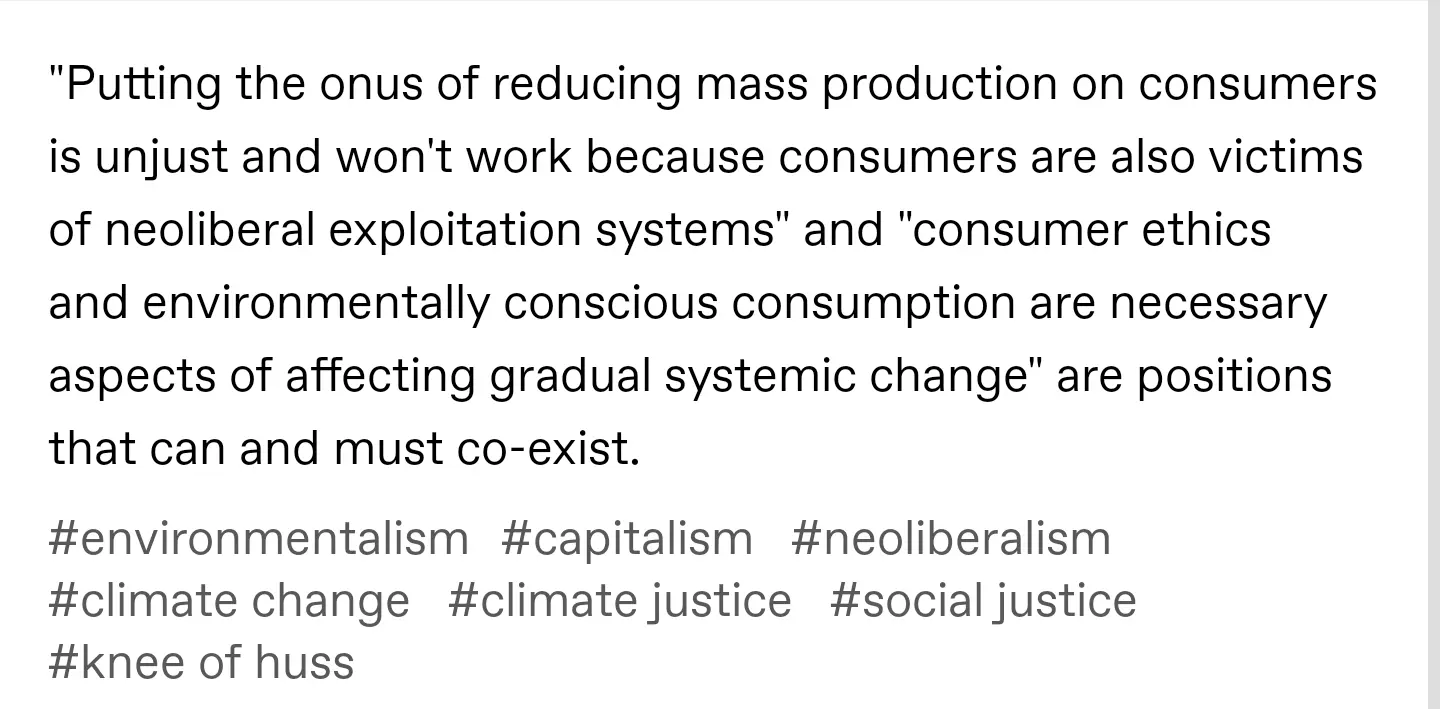this post was submitted on 26 Sep 2023
241 points (93.8% liked)
Solarpunk
5726 readers
3 users here now
The space to discuss Solarpunk itself and Solarpunk related stuff that doesn't fit elsewhere.
Join our chat: Movim or XMPP client.
founded 2 years ago
MODERATORS
you are viewing a single comment's thread
view the rest of the comments
view the rest of the comments

Slowing/stopping/reversing climate change could be achieved much more readily if "people" (in general or specifically activists) were willing to accept some sacrifice, which is to say decrease in their standard of living.
However, I think that's a third rail that no one wants to touch. See "veganism is too hard", "biking takes too long", "I'm really busy, I have to use plastic water bottles", etc. There are of course people for which it really is not possible, but also many where they are just unwilling to sacrifice.
Therefore, the only way to maintain our current standard of living while ameliorating climate change is through rapid technological advancement. I'm not hopeful.
I feel like this is the option that is most discussed in public discourse, which is the problem. If we discuss climate change through the lense of "Why don't people bike, since driving is bad for the planet?" rather than "What structural changes (bike lanes, public transit, car-free city centers, etc.) can we offer to encourage people to cycle more?" or even "What are the biggest transport-related emissions (private jets, flying in fresh fruit from halfway across the world, using trucks for shipping, etc.) and how can we work as a society to eliminate them?", then people will feel disenfranchised, and even if we all started cycling it wouldn't help nearly as much as if we tackled the bigger corporate issues. It's neither pragmatic nor fair to focus on individual action at the scale of single consumers.
I agree with that wholeheartedly. "How do we make people want to behave better" is the question I want to pour my energy at, and I don't think shaming them and making them defensive is the way to do it.
Because right now, we mostly do the opposite. We systematically encourage people to make the wrong choices through our markets and built environments. And pearl-clutching about bad actors in that environment is totally unreasonable and unfair, in my opinion.
That's a great point. I hadn't thought about it quite that way before. Thanks.
I had to think about this a bit. Ultimately, I still can't think of any historical precedents where a people reacted proactively to a threat with relatively unknown consequences (to the individual). Maybe I'm missing something.
While it does no harm (and in fact probably makes sense) to invest in multiple strategies to fight climate change as a society, I have to admit that I don't think attempting to change people's minds regarding climate change is the most effectual. Consider that not only do you have to convince the "Western" world (which already has a high standard of living) to reduce emissions, you also have to somewhat repress development of nations which are striving to industrialize and will almost certainly be emitting more greenhouse and toxic gases in the future. See China, India, Africa, etc.
I agree that blaming consumers is counter-productive to the goal of convincing society to be more sustainable, but given the limited time we have, technologies like carbon capture, fusion, massive solar/wind, should be the core strategy in ameliorating the effects of climate change.